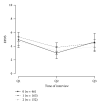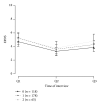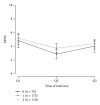Genetic variants in the genes of the stress hormone signalling pathway and depressive symptoms during and after pregnancy
- PMID: 24741566
- PMCID: PMC3972848
- DOI: 10.1155/2014/469278
Genetic variants in the genes of the stress hormone signalling pathway and depressive symptoms during and after pregnancy
Abstract
Purpose: The aim of this study was to investigate whether single nucleotide polymorphisms (SNPs) in genes of the stress hormone signaling pathway, specifically FKBP5, NR3C1, and CRHR1, are associated with depressive symptoms during and after pregnancy.
Methods: The Franconian Maternal Health Evaluation Study (FRAMES) recruited healthy pregnant women prospectively for the assessment of maternal and fetal health including the assessment of depressiveness. The German version of the 10-item Edinburgh Postnatal Depression Scale (EPDS) was completed at three time points in this prospective cohort study. Visit 1 was at study entry in the third trimester of the pregnancy, visit 2 was shortly after birth, and visit 3 was 6-8 months after birth. Germline DNA was collected from 361 pregnant women. Nine SNPs in the above mentioned genes were genotyped. After construction of haplotypes for each gene, a multifactorial linear mixed model was performed to analyse the depression values over time.
Results: EPDS values were within expected ranges and comparable to previously published studies. Neither did the depression scores differ for comparisons among haplotypes at fixed time points nor did the change over time differ among haplotypes for the examined genes. No haplotype showed significant associations with depressive symptoms severity during pregnancy or the postpartum period.
Conclusion: The analysed candidate haplotypes in FKBP5, NR3C1, and CRHR1 did not show an association with depression scores as assessed by EPDS in this cohort of healthy unselected pregnant women.
Figures
Similar articles
-
Genetic variants in the glucocorticoid pathway genes and birth weight.Arch Gynecol Obstet. 2021 Feb;303(2):427-434. doi: 10.1007/s00404-020-05761-6. Epub 2020 Sep 4. Arch Gynecol Obstet. 2021. PMID: 32886236
-
Genetic variants in the genes of the sex steroid hormone metabolism and depressive symptoms during and after pregnancy.Arch Gynecol Obstet. 2023 Jun;307(6):1763-1770. doi: 10.1007/s00404-022-06644-8. Epub 2022 Jun 10. Arch Gynecol Obstet. 2023. PMID: 35680688
-
Association of glucocorticoid and type 1 corticotropin-releasing hormone receptors gene variants and risk for depression during pregnancy and post-partum.J Psychiatr Res. 2013 Sep;47(9):1166-73. doi: 10.1016/j.jpsychires.2013.05.003. Epub 2013 May 30. J Psychiatr Res. 2013. PMID: 23726670
-
Genetics of glucocorticoid regulation and posttraumatic stress disorder--What do we know?Neurosci Biobehav Rev. 2016 Apr;63:143-57. doi: 10.1016/j.neubiorev.2016.02.005. Epub 2016 Feb 9. Neurosci Biobehav Rev. 2016. PMID: 26872620 Review.
-
The role of rs242941, rs1876828, rs242939 and rs110402 polymorphisms of CRHR1 gene and the depression: systematic review and meta-analysis.Genes Genomics. 2021 Nov;43(11):1339-1349. doi: 10.1007/s13258-021-01133-9. Epub 2021 Jul 19. Genes Genomics. 2021. PMID: 34279801
Cited by
-
Genetic variations in estrogen and progesterone pathway genes in preeclampsia patients and controls in Bavaria.Arch Gynecol Obstet. 2021 Apr;303(4):897-904. doi: 10.1007/s00404-020-05812-y. Epub 2020 Sep 30. Arch Gynecol Obstet. 2021. PMID: 33000295
-
Genetic Markers Associated with Postpartum Depression: A Review.Neuropsychiatr Dis Treat. 2024 Feb 15;20:281-293. doi: 10.2147/NDT.S434165. eCollection 2024. Neuropsychiatr Dis Treat. 2024. PMID: 38375417 Free PMC article. Review.
-
Prenatal Alcohol Exposure Is Associated With Adverse Cognitive Effects and Distinct Whole-Genome DNA Methylation Patterns in Primary School Children.Front Behav Neurosci. 2018 Jun 26;12:125. doi: 10.3389/fnbeh.2018.00125. eCollection 2018. Front Behav Neurosci. 2018. PMID: 29997484 Free PMC article.
-
Precision medicine in perinatal depression in light of the human microbiome.Psychopharmacology (Berl). 2020 Apr;237(4):915-941. doi: 10.1007/s00213-019-05436-4. Epub 2020 Feb 17. Psychopharmacology (Berl). 2020. PMID: 32065252 Review.
-
Genetic variants in the glucocorticoid pathway genes and birth weight.Arch Gynecol Obstet. 2021 Feb;303(2):427-434. doi: 10.1007/s00404-020-05761-6. Epub 2020 Sep 4. Arch Gynecol Obstet. 2021. PMID: 32886236
References
-
- Gawlik S, Reck C, Kuelkens S, et al. Prenatal depression and anxiety what is important for the obstetrician? Geburtsh Frauenheilk. 2010;70(5):361–368.
-
- Perfetti J, Clark R, Fillmore C-M. Postpartum depression: identification, screening, and treatment. Wisconsin Medical Journal. 2004;103(6):56–63. - PubMed
-
- Reulbach U, Bleich S, Knörr J, et al. Pre-, peri- and postpartal depression first cognition from FRAMES (Franconian Maternal Health Evaluation Studies) Fortschritte der Neurologie Psychiatrie. 2009;77(12):708–713. - PubMed
Publication types
MeSH terms
Substances
LinkOut - more resources
Full Text Sources
Other Literature Sources
Medical
Miscellaneous




